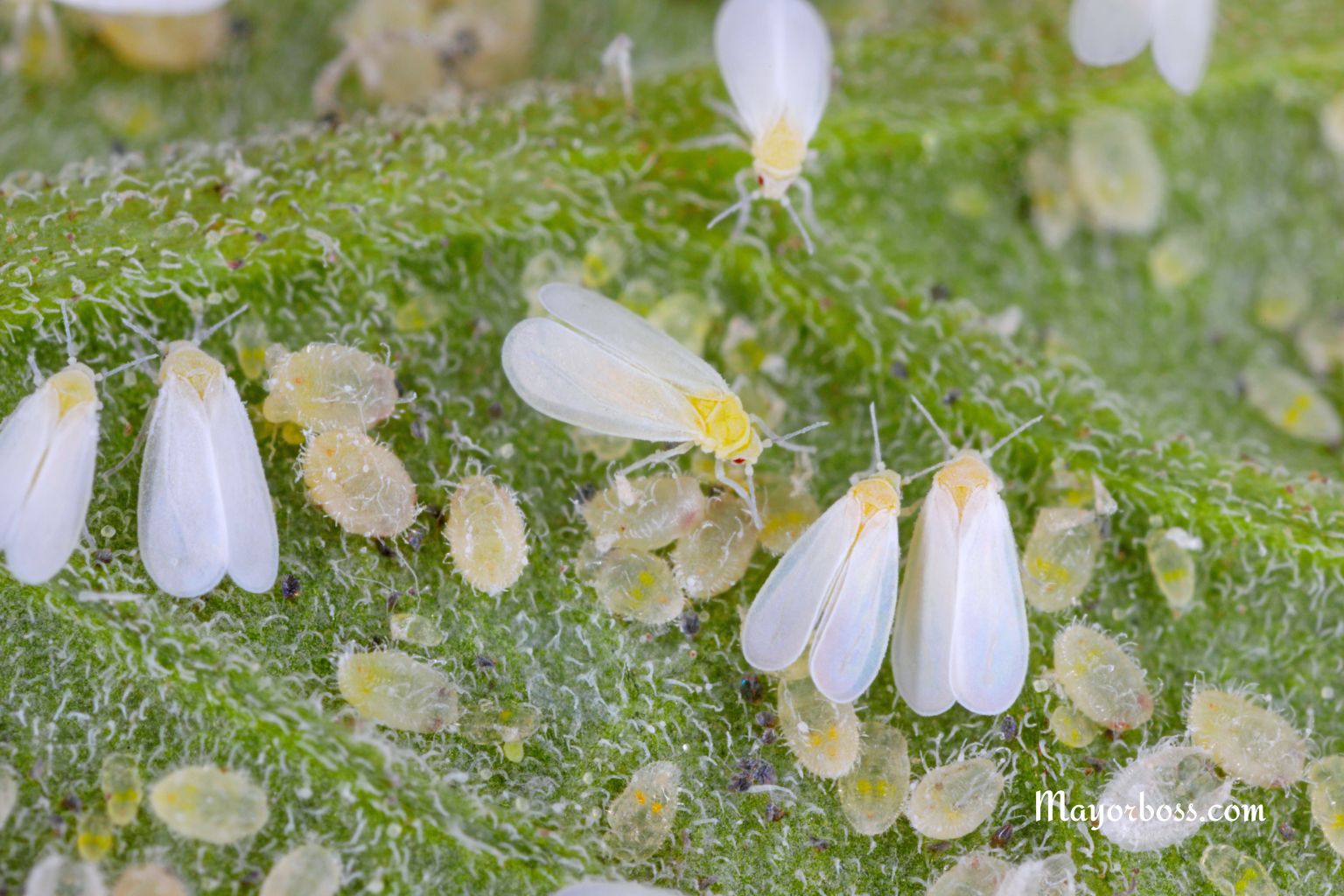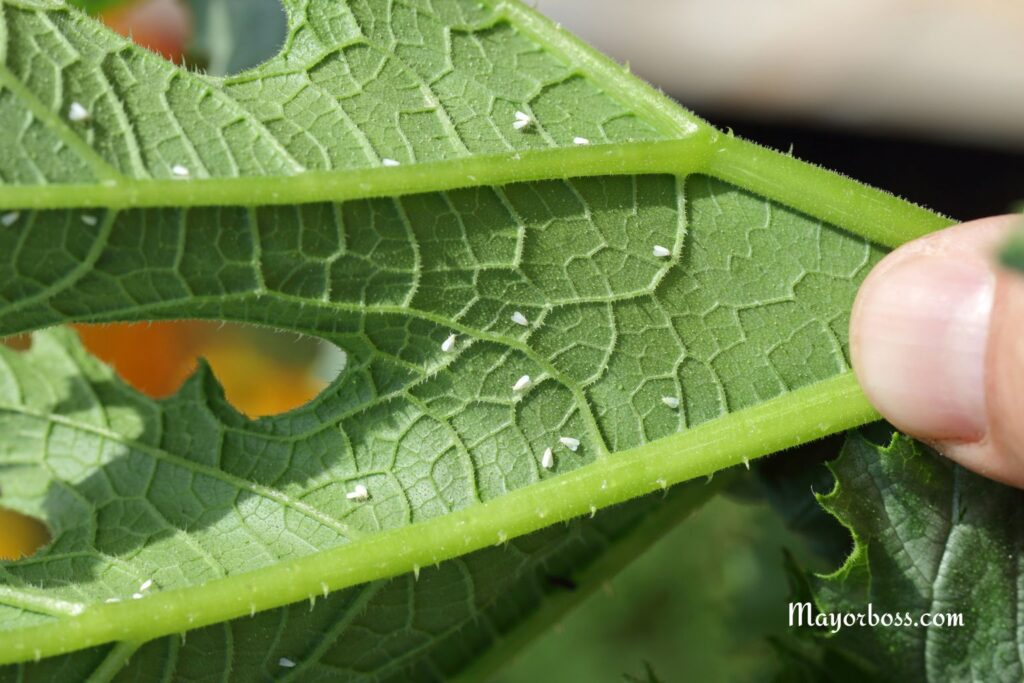How to Finally Get Rid of Whiteflies Before They Ruin Your Plants
To get rid of whiteflies, inspect your plants for tiny white insects and their eggs, remove heavily infested leaves, and use insecticidal soap or neem oil spray. Encourage natural predators like ladybugs, and keep plants healthy with regular watering and proper spacing to prevent future infestations.

Most gardeners have come across the whitefly at some point. This tiny pest can be found on a wide variety of plants—cucumbers, tomatoes, Eggplant, lettuce, bell pepper, sweet potato, and even many ornamental crops. But whiteflies are especially dangerous for cabbage.
Colonies of these small, moth-like insects feed on plant juices, quickly draining the strength from your garden. If left unchecked, whiteflies can multiply rapidly and, within a few weeks, may completely destroy your crop.
Whiteflies are tiny, winged insects that feed on the sap of plants. You often notice them when you touch a plant and a cloud of small, white bugs flies up. They hide on the undersides of leaves and lay eggs in clusters, making them hard to spot until there’s a problem.1
Whiteflies cause trouble for many gardeners. As they feed, they weaken plants, cause leaves to yellow, and even transmit diseases. They also leave behind a sticky substance called honeydew, which can attract ants and lead to black, sooty mold.2
Controlling whiteflies is essential for anyone who grows vegetables or cares for ornamental plants.
Spotting a Whitefly Problem
Before you can get rid of whiteflies, you need to know they’re there. Signs include:
- Clouds of tiny white insects fly when you disturb the plant
- Yellowing or dropping leaves
- Sticky residue (honeydew) on leaves
- Black mold growing on honeydew

Check the undersides of leaves—this is where whiteflies live and lay eggs.
Remove by Hand
For smaller infestations, remove whiteflies and their eggs by hand. Gently wipe the undersides of leaves with a damp cloth, or prune and discard heavily infested leaves. Seal them in a plastic bag before throwing them away to prevent the insects from spreading.
Use a Strong Blast of Water
A simple but effective way to reduce whitefly numbers is to spray plants with a strong jet of water. This knocks whiteflies, eggs, and larvae off the leaves. Repeat this every few days until you see fewer bugs.
Insecticidal Soap or Neem Oil
Both insecticidal soap and neem oil are safe for most plants and effective against whiteflies. Spray the underside of leaves thoroughly, following the product’s instructions. These sprays kill whiteflies on contact but need to be reapplied every week until the problem improves.3
- Insecticidal Soap: Safe for food crops and ornamental plants
- Neem Oil: Natural oil that disrupts whiteflies’ life cycle
Test on a small area first to make sure your plant does not react poorly.
Encourage Natural Predators
Nature can help you control whiteflies. Certain insects eat whiteflies and their eggs, keeping their numbers in check. The most helpful natural predators include:
- Ladybugs
- Lacewing larvae
- Parasitic wasps
You can attract these beneficial insects by planting flowers like marigolds, dill, or fennel. Avoid broad-spectrum insecticides, as they can kill helpful bugs.
Use Sticky Traps
Yellow sticky traps attract adult whiteflies. Place them around infested plants to catch the insects as they fly. This method helps reduce the adult population and also gives you an idea of how bad the problem is.
Keep Plants Healthy
Whiteflies attack stressed or weak plants more often. Support plant health with proper watering, fertilizing, and spacing. Remove weeds and plant debris, as these can harbor pests. Avoid over-fertilizing, as this can make plants more attractive to whiteflies.
Prevent Future Infestations
- Inspect new plants for whiteflies before bringing them home
- Clean up garden debris and fallen leaves
- Space plants to allow for good airflow
- Rotate crops in vegetable gardens to reduce recurring pest problems
When to Call for Professional Help
If whiteflies continue to spread and home remedies are not enough, consider asking a local garden center or pest control professional for advice. Persistent or severe infestations sometimes require special treatments.
Takeaways
- Inspect plants regularly, especially the undersides of leaves
- Use water sprays, insecticidal soap, or neem oil
- Attract natural predators
- Keep plants healthy and remove plant debris
- Use sticky traps to monitor and reduce adult whiteflies
Frequently Asked Questions
1. Are whiteflies harmful to humans?
No, whiteflies do not bite or harm humans. They only damage plants.
2. Can I use dish soap to kill whiteflies?
Yes, but only mild dish soap. Mix one teaspoon in a liter of water and spray on affected plants. Test on a small area first to avoid plant damage.
3. How often should I use neem oil or insecticidal soap?
Spray once a week, or as directed on the label, until you no longer see whiteflies.
4. What plants do whiteflies attack?
Whiteflies attack many plants, including tomatoes, peppers, cucumbers, and many houseplants.
5. Will whiteflies go away on their own?
It’s unlikely. Without action, they usually get worse and can kill your plants.
References:
- https://entomology.ca.uky.edu/ef456 ↩︎
- https://ucanr.edu/site/master-gardeners-ventura-county/controlling-whiteflies-your-garden ↩︎
- https://www3.epa.gov/pesticides/chem_search/reg_actions/registration/fs_PC-025006_07-Apr-10.pdf ↩︎






